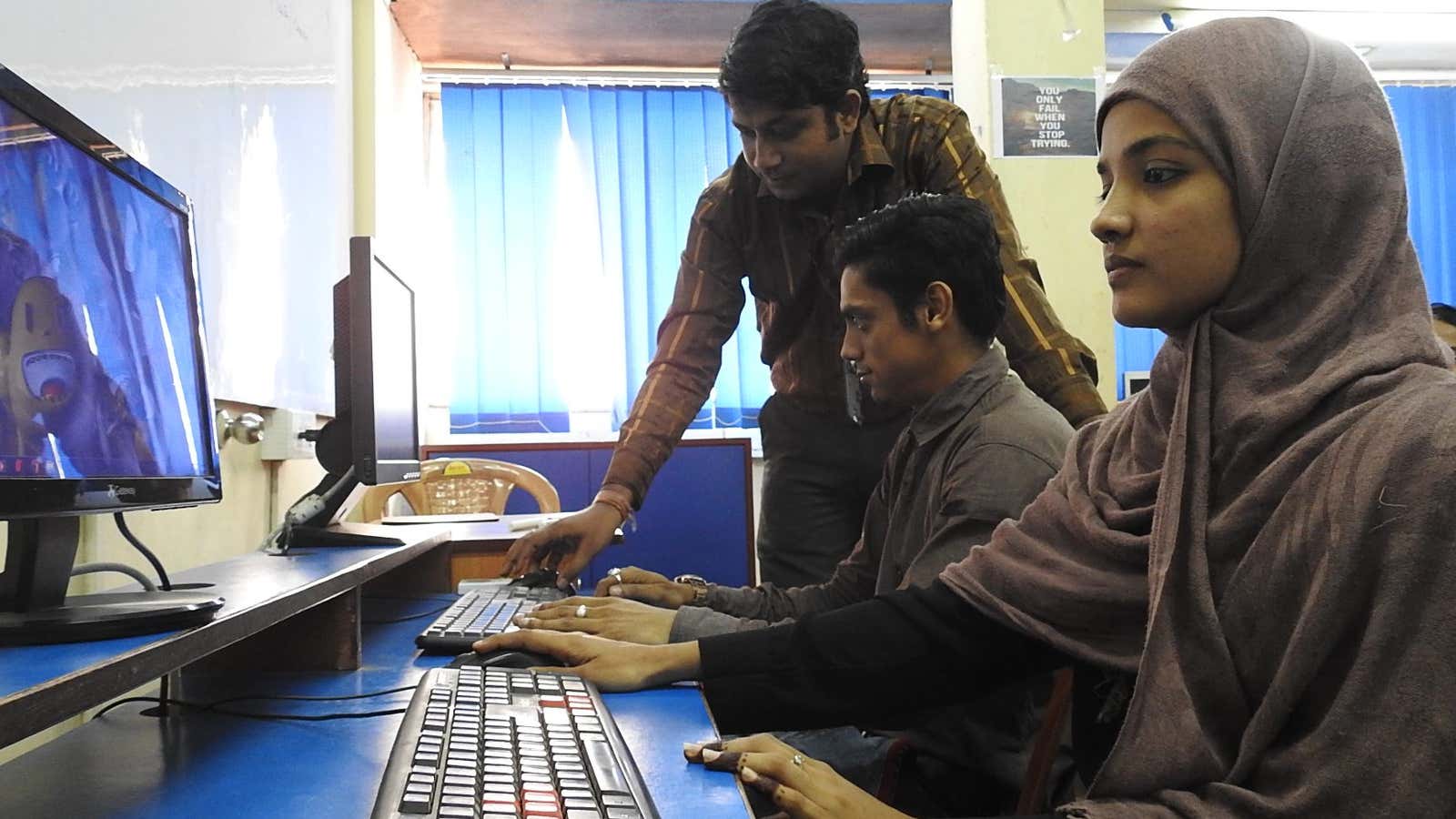Thirty-year-old Chandi Mandal is a customer service representative at Aegis, a business process outsourcing (BPO) company in Kolkata, earning Rs8,600 ($133) monthly. Unlike six months ago, today he successfully manages his household expenses.
But things were very different back then. Despite finishing school and college, Mandal couldn’t find stable employment in his village in West Midnapur district of India’s West Bengal state. A congenital disability that prevents him from staying on his feet for more than a few minutes at a stretch ruled out labour-intensive jobs. Besides, Mandal’s two-year-old daughter, too, suffers a similar ailment.
In short, he was desperate.
So early this year, a cash-strapped Mandal attended a three-month program at the Anudip Foundation, a not-for-profit skills development organisation in Kolkata. Anudip trains unskilled people from tier-II cities like Vishakhapatnam, Indore, Jaipur, Bhubhaneshwar, and beyond, for tech roles. Mandal’s course comprised basic training in Microsoft Word, Excel, and Powerpoint, spoken English, and grooming for work placement. Soon after completing his course, he secured a job under Anudip’s guidance, based on merit.
Many aspirants like Mandal, mostly from small-town India, are held back by physical disabilities, poor socio-economic backgrounds, or a lack of education. Now, such marginalised people have found hope in organisations like Anudip. Other such organisations include Delhi-based Humana People to People India and Hyderabad-based Dr.Reddy’s Foundation. While Humana teaches skills like basic computing and data entry and mobile repairing, Dr.Reddy’s helps marginal farmers in 20 states leverage technology to raise outputs.
Such training helps even those who want to switch careers. For instance, Debosree Majumdar, an honors graduate in the Bengali language, is now a web designer with Kolkata-based NGO Ultra Vision Creative after completing a five-and-a-half month course from the same organisation.
Changing tides
India’s $150 billion IT industry, too, has reason to be happy as market-aligned skills training gains traction in the country. The likes of Mandal and Majumdar are getting the jobs that usually don’t find many takers. Often, small-town talent is a better fit for repetitive, low-skill tasks than engineering graduates.
“These are the sort of jobs that engineering grads would look down their nose at,” according to Dipak Basu, CEO of Anudip, whose 3-6 month courses train roughly 4,000 students free of cost in India each quarter. The organisation has a revenue stream through course fees for specialised one-off, short-term courses for various companies and it makes up for any shortfall through grants from institutional donors and corporations.
An on-demand digital data services firm called iMerit draws over 80% of its talent straight from Anudip. It gives them tasks to perform for a variety of technology clients across India and the US. These tasks range from digitally tagging images of vehicular traffic for a German autonomous vehicle maker to creating agricultural layouts for large areas to cancer cell categorisation. The employees of iMerit have verified driver documents for Uber, validated information on hotels and travel sites, and categorised data and images for e-commerce sites, Forbes India reported. Alongside, iMerit provides skilling programs to its employees to fill any gaps in their knowledge.
However, in a world where technology is changing rapidly, it’s hard to keep up.
“The computer is not a simple thing that you can learn in three months. And this is a basic course, not a diploma,” Mandal said. “If the courses ran for more time, it would be better.”
Another key hurdle in this market-aligned skills training model is distrust.
The Indian attitude
Luckily for iMerit, 90% of its clientele is in the US. In India, people are wary of asking a non-engineer to perform tech-related tasks.
“With the US clients, it’s not an issue. We do proof of concept, we do pilots. Sometimes, we don’t even speak to them about the social impact side. As long as they’re happy with the skilling, the retention, the technology platform, and the output is there, they’re happy,” Radha Basu, CEO of iMerit, said. ”There is still a bit of a stigma in India and I want to break that glass ceiling.”
Referring to the plus side of recruiting small towners, she said they are eager to learn but not quick to leave—iMerit’s attrition rate is under 3%.
However, if these newly-groomed techies are not recruited immediately after the completion of the course, they forget what they learnt, Anudip’s Basu said. Even when they find jobs, employers are expected to help them hone their existing skills further and teach new ones.
Moreover, aspirants with unconventional backgrounds like, say, agriculture or fishing can have unconventional work ethics, too. They may not be used to a 9-to-5 work day, Basu said. Some even walk in according to when the water at home is warm enough to bathe.
